九年级英语Unit4复习
Unit 4 (单元复习课件)-九年级英语全一册(人教新目标Go for it!)
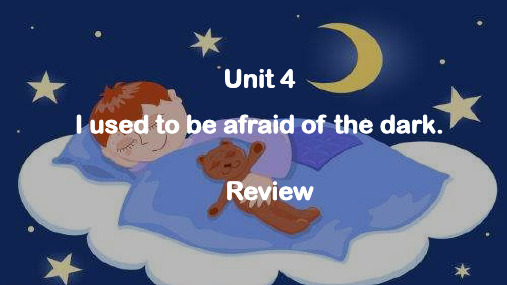
审题 1.审主题: 我的变化 2. 审体裁: 说明文 3.审人称: 第一人称 4.审时态: 一般过去时,一般现在时 5. 审要点: 过去与现在的对比
Writing
Follow the prompts to write an article to talk about your change.
A.Even
B.Even though C.If
D.Unless
(A)4. You can made a _____ instead of him.He doesn't have to go
there_____ person.
A.decision;in B.decide;in C.decision;by D.decide;by
05 Writing
Writing
Write about how you have changed. What did you use to be like? Which change is the most important one and why?
Try to write two paragraphs. Paragraph 1: General introduction about the changes in your life Paragraph 2: The most important
Language points
Point 7.Now she’s not shy anymore and loves singing in front of crowds. not ... anymore = no more,不再 e.g:He doesn't come late anymore.
英语九年级Unit 4重点短语和知识点梳理

英语九年级Unit 4重点短语和知识点梳理重点单词silent / 'saɪlənt/ adj. 不说话的;沉默的helpful / ˈhelpfl/ adj. 有用的;有帮助的score / skɔ:(r)/ n. & v. 得分;进球deal /di:l/ v.(dealt/delt/) 对付;对待shyness / 'ʃaɪnəs / n.含羞;腼腆dare / deə/ v. 敢于;胆敢crowd /kraʊd/ n.人群;观众ton /tʌn/ n.吨;(pl.)大量;许多private / 'praɪvət/ adj. 私人的;私密的require / rɪ'kwaɪə(r)/ v. 需要;要求British / ˈbrɪtɪʃ/ adj. 英国(人)的speech / spi:tʃ/ n. 讲话;发言ant / ænt/ n. 蚂蚁insect / ˈɪnsekt/ n. 昆虫seldom /'seldəm/ adv. 不常;很少influence /'ɪnflʊəns/ v. & n. 影响exactly /ɪgˈzæktli/ adv. 确切地;精确地absent /'æbsənt/ adj. 缺席;不在pride /praɪd/ n. 自豪;骄傲proud /praʊd/ adj. 自豪的;骄傲的introduction /ˌɪntrəˈdʌkʃn/ n. 介绍background / ˈbæk graʊnd/ n. 背景fail /feɪl/ v. 不及格;失败humorous / ˈhju:mərəs/ adj. 有幽默感的;滑稽有趣的interview / 'ɪntəvju:/ v. 采访;面试n. 面试;访谈public /'pʌblɪk/ n.民众adj.公开的;公众的guard /ɡɑ:(r)d/ n. 警卫;看守v. 守卫;保卫European / ˌjʊ(ə)rəˈpi:ən/ adj. 欧洲(人)African /ˈæfrɪkən/ adj.非洲(人)的n.非洲人Asian /ˈeɪʃn/ adj. 亚洲(人)的n. 亚洲人general /'dʒenrəl/ adj. 普遍的;常规的;总的n. 将军examination /ɪgˌzæmɪˈneɪʃn/ n. 考试;审查boarding /'bɔ:dɪŋ/ school 寄宿学校重点单词ed to do 过去常常做2. deal with 对付应付3. be proud of为……骄傲,感到自豪4. take pride in为……感到自豪5.from time to time 时常,有时6. in public 公开地7. in person 亲身,亲自8. take up sth.开始做,接受,占用9. worry about 为……担忧10. on the soccer team 在足球队11. hang out 闲逛12. think about 考虑13. make a decision 做决定14. to one’s surprise令某人吃惊的是15. even though 尽管16. tons of 很多17. a very small number of …极少数的…… 18. one of… ……之一19. be careful 当心重点知识点解析ev.& n. 使用,用途→ useful adj.有用的useless adj.无用的用法意思例句used to do sth .过去常常,过去曾经做某事I used to play basketball.(我过去常常打篮球。
人教版英语九年级全册单元unit 4 知识点+测试卷+思维导图

Unit 4 I used to be afraid of the dark.1.重点词汇score, background, guard, speech, public, ant, examination, pride, introduction, interview, dare, require, influence, fail, humorous...2. 短语归纳:ed to do 过去常常做2.deal with 对付;应付3.be proud of 为……骄傲,感到自豪4.take pride in 为……感到自豪5.from time to time 时常,有时6.in public 公开地7.in person 亲身,亲自8.take up sth 开始做,接受,占用9.not…anymore 不再10.worry about 为……担忧11.hang out 闲逛12.think about 考虑13.be alone 独处14.on the soccer team 在足球队15.no longer 不再16.make a decision 做决定17.to one’s surprise 令某人吃惊的是18.even though 尽管19.pay attention to 对……注意,留心20.in the last few years 在过去的几年里3. 必背典句:1. I used to be short. 我过去很矮。
2. I didn’t use to be popular in school. 我过去在学校不受欢迎。
3. -You used to be short, didn’t you? 你过去很矮,是吗?-Yes, I did./No, I didn’t. 是的,我是;不,我不是。
4. -Did he use to wear glasses? 他以前戴眼镜吗?-Yes, he did./ No, he didn’t. 是的,他是;不,他不是。
人教版英语九年级全册Unit4复习课件
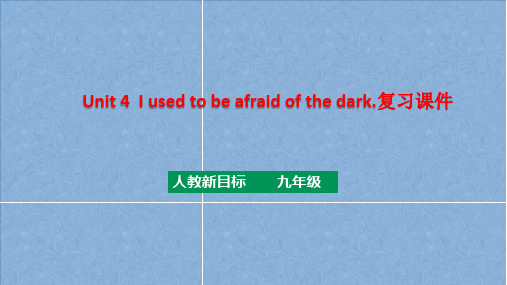
2. What’s he like now? 他现在什么样子? What +be +主语+like? 用来询问某人的外 貌特征,意为“…长什么样?”,相当于what do /does +主语+like? ►---What’s your brother like?=What does your brother like? 你哥哥张什么样? 辨析:be like 和look like be like: “像…一样”,常指品德、相貌等相像 ,
= I don’t know what they do with the problem.
2) 动词不定式短语 to deal with 后必须带宾语。 ► I don’t know how to deal with it.
我不知道如何处理这件事。
(3)shyness 名词,意为“害羞;腼腆”是形 容词shy 加后缀-ness 构成的名词。 ► He can’t get over his shyness. 拓展:sad -------- sadness
in the front of :“在…… 的前部”,强调在某一 物体内部的前面
(3)whole 形容词,意为“整个的;全部的”,常 用结构为“the+whole+单数名词”。all也有 此意,但语序不同:all用于冠词、所有格 或其他限定词之前;whole用于冠词、所有 格及其他限定词之后。
all the time
Grammar Focus
I used to be short
I didn’t use to be popular in school.
Paula used to be really quiet.
人教版英语九年级全册Unit 4-Unit 6复习课件
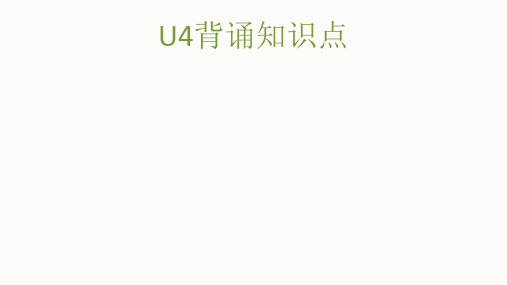
3. humorous adj. 有幽默感的,滑稽有趣的 变形: humor n.幽默
4.silent adj. 不说话的,沉默的 remain/stay/keep silent 保持沉默 in silence 安静地,无声地=silently n.silence 5.helpful adj.有用的,有帮助的,乐于助人的 be helpful to sb. 对某人有帮助
6.general adj.总的/普遍的/常规的 n. 将军---generally adv.一般地/普遍地 in general =generally speaking 一般来说
7.introduction n.介绍 brief introduction 简介 make an introduction 做介绍 introduce oneself自我介绍 introduce A to B 把A介绍给B
14. in the last /past +时间段 在过去的...里 15. be there for 随叫随到;不离……左右
U5背诵知识点
• chopsticks [ˈtʃɒpstɪks] n. 筷子 two pairs of chopsticks • coin [kɔɪn] n.硬币 corner n.角落 • fork [fɔ:k] n.餐叉 a knife and fork 一副刀叉(做主谓单) • a knife and a fork 一把刀和一个叉(做主谓复) • blouse [blaʊz] n.(女士)短上衣;衬衫 • silver [ˈsɪlvə] n. 银,银器; adj.银色的 silver hair银发 gold金 • glass [glɑːs] n.玻璃 玻璃杯 a piece of glass a glass of一杯.. • 眼镜 a pair of glasses • cotton [ˈkɒtn] n.棉;棉花不可数,mutton 羊肉不可数 • fair [feər] n. 展览会;交易会 • environmental [ɪnˏvaɪərənˈmentl] adj. 自然环境的;有关环境的
Unit4单元知识点汇总 人教版英语九年级全册
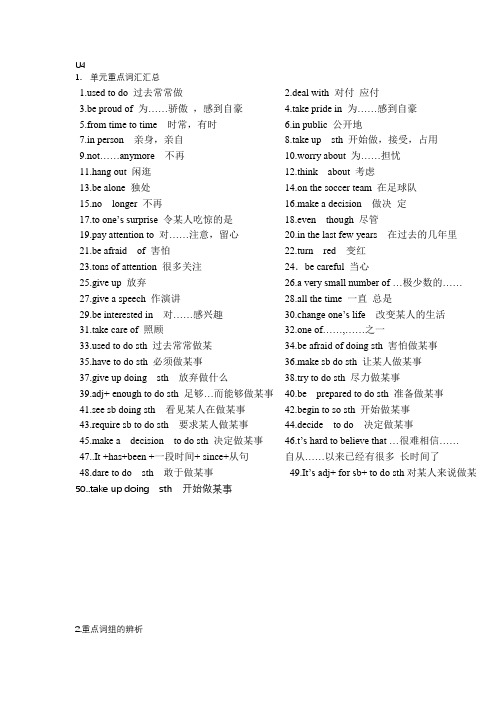
U41.单元重点词汇汇总ed to do 过去常常做2.deal with 对付应付3.be proud of 为……骄傲,感到自豪4.take pride in 为……感到自豪5.from time to time 时常,有时6.in public 公开地7.in person 亲身,亲自8.take up sth 开始做,接受,占用9.not……anymore 不再10.worry about 为……担忧11.hang out 闲逛12.think about 考虑13.be alone 独处14.on the soccer team 在足球队15.no longer 不再16.make a decision 做决定17.to one’s surprise 令某人吃惊的是18.even though 尽管19.pay attention to 对……注意,留心20.in the last few years 在过去的几年里21.be afraid of 害怕22.turn red 变红23.tons of attention 很多关注24.be careful 当心25.give up 放弃26.a very small number of …极少数的……27.give a speech 作演讲28.all the time 一直总是29.be interested in 对……感兴趣30.change one’s life 改变某人的生活31.take care of 照顾32.one of……,……之一ed to do sth 过去常常做某34.be afraid of doing sth 害怕做某事35.have to do sth 必须做某事36.make sb do sth 让某人做某事37.give up doing sth 放弃做什么38.try to do sth 尽力做某事39.adj+ enough to do sth 足够…而能够做某事40.be prepared to do sth 准备做某事41.see sb doing sth 看见某人在做某事42.begin to so sth 开始做某事43.require sb to do sth 要求某人做某事44.decide to do 决定做某事45.make a decision to do sth 决定做某事46.t’s hard to believe that …很难相信……47..It +has+been +一段时间+ since+从句自从……以来已经有很多长时间了48.dare to do sth 敢于做某事49.It’s adj+ for sb+ to do sth对某人来说做某50..take up doing sth 开始做某事2.重点词组的辨析辨析:used to do sth. 过去常常做…get/be used to sth./doing sth. 现在习惯于…be used to do 被用于做…(被动语态)be used by 由(被)…使用(被动语态)be used as … 被当做…使用(被动语态)be used for doing 被用于做…(被动语态)例: I used to go to work by bus. Now I take a taxi.He used to be a problem boy. She used to be very shy.I’m used to drinking a cup of water after meal.He’s been used to living in the dormitory.A hammer is used to drive nails.This machine is used to clean the floor.The girl is being used as a servant in the house.A knife can be used for cutting bread.used to的用法“used to+动词原形”表示过去常常干某事,现在不在干了。
Unit4知识清单(预习复习知识点详解)-牛津译林版九年级英语上册

9A Unit 4 Growing up 知识清单一、Comic strip and Welcome to the unit.1.grow up 长大Eg: grow up into a beautiful girl 长成一个漂亮的姑娘’s on your mind? 你在想什么?★on one’s mind 挂在心上;惦念【in one’s mind 在某人的脑海里】’s up?= What’s wrong? =What’s the matter? 怎么了?4.That’s all right. / That’s OK./ Never mind . / It doesn’t matter. 没关系,不要紧。
5. build another one for yourself 为你自己再建一个【build sth. for sb.为某人建造某物】6. Don’t wake me up until you finish building it. 【finish doing sth. 做完某事】直到你建完后再叫醒我。
【until引导时间状从,主将从现】7.do a survey on ..... 做一个关于......的调查8.in different times 在不同的时代【time作可数名词:时代;作不可数名词:时间】9.I can read them whenever I want to. 无论何时我想读的时侯就可以读。
Eg: I will help you whenever you are in trouble. 【whenever引导时间状从,主将从现】whenever = no matter when 无论何时whatever = no matter what 无论什么whoever = no matter who 无论是谁10.learn about the world through the Internet通过/凭借因特网了解这个世界11. As soon as you click the mouse, there’s a great deal of information.①a great deal of = much 大量的【只能修饰不可数名词】②as soon as .... 一.....就..... (引导时间状语从句,主将从现)Eg: We will go on working as soon as the rain stops.二、Reading1.While (he was) attending junior high, Spud tried out for the school team.在就读初中时,Spud报名参加校队。
初中英语 人教版 九年级全一册 Unit 4 知识点
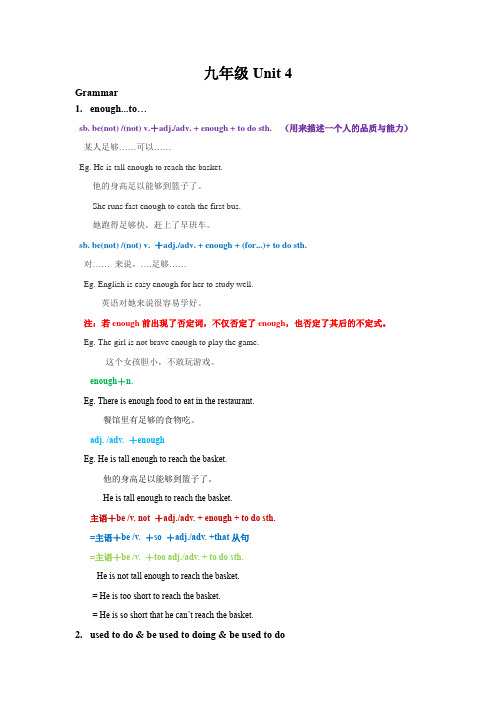
九年级Unit 4Grammar1.enough...to…sb. be(not) /(not) v.+adj./adv. + enough + to do sth. (用来描述一个人的品质与能力)某人足够……可以……Eg. He is tall enough to reach the basket.他的身高足以能够到篮子了。
She runs fast enough to catch the first bus.她跑得足够快,赶上了早班车。
sb. be(not) /(not) v. +adj./adv. + enough + (for...)+ to do sth.对…… 来说,….足够……Eg. English is easy enough for her to study well.英语对她来说很容易学好。
注:若enough前出现了否定词,不仅否定了enough,也否定了其后的不定式。
Eg. The girl is not brave enough to play the game.这个女孩胆小,不敢玩游戏。
enough+n.Eg. There is enough food to eat in the restaurant.餐馆里有足够的食物吃。
adj. /adv. +enoughEg. He is tall enough to reach the basket.他的身高足以能够到篮子了。
He is tall enough to reach the basket.主语+be /v. not +adj./adv.+ enough+ to do sth.=主语+be /v. +so +adj./adv.+that从句=主语+be /v. +too adj./adv.+ to do sth.He is not tall enough to reach the basket.= He is too short to reach the basket.= He is so short that he can’t reach the basket.ed to do & be used to doing & be used to doused to do sth. 过去常常做某事(现在不做了)主语适用于各种人称。
人教版九年级英语 Unit4 复习课件 (共15张ppt)
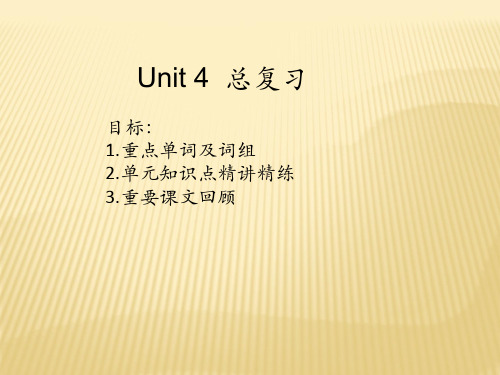
目标: 1.重点单词及词组 2.单元知识点精讲精练 3.重要课文回顾
Task 1: 请同学们翻到P159页,自读单词,然后听写。
Task 2: 词汇联想:
silent (adj.)---- n._s_i_le_n__c_e
helpful (adj.)---- v.&n._h_e_l_p_
3. deal with; do with处理,解决 deal—dealt—dealt, 同义短语为do with
deal with 与疑问词how连用,do with与疑问词what连用 eg. I don’t know how to deal with the problem.
=I don’t know what to do with the problem. 4. It is /has been + 时间 + since 从句 例如:It’s /has been three years since we met last. 自从我们上次 见面已有三年了。 5. fail 失败 fail (in) the exam 考试不及格; pass the exam通过考试
African----非洲_A__f_r_i_c_a__
British----英国__B_r_it_ia_n_/England examination----(缩写)_e_x_a__m_ v._e_x_a_m__i_ne exactly (adv.)----adj._e_x__a_c_t_ pride----adj._p_r_o_u_d__
he have short hair? Yes, he
No, he
反意疑问句:
She used to be shy,_____ _____? /
人教版英语九年级上册Unit4知识点梳理及语法讲解
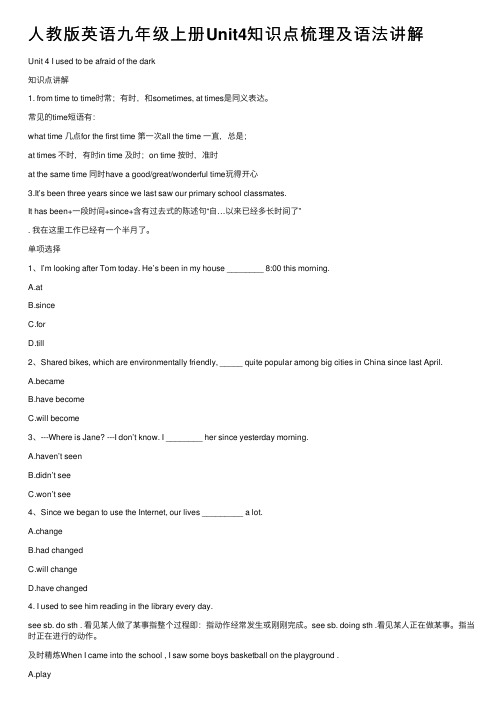
⼈教版英语九年级上册Unit4知识点梳理及语法讲解Unit 4 I used to be afraid of the dark知识点讲解1. from time to time时常;有时,和sometimes, at times是同义表达。
常见的time短语有:what time ⼏点for the first time 第⼀次all the time ⼀直,总是;at times 不时,有时in time 及时;on time 按时,准时at the same time 同时have a good/great/wonderful time玩得开⼼3.It’s been three years since we last saw our primary school classmates.It has been+⼀段时间+since+含有过去式的陈述句“⾃…以来已经多长时间了”. 我在这⾥⼯作已经有⼀个半⽉了。
单项选择1、I’m looking after Tom today. He’s been in my house ________ 8:00 this morning.A.atB.sinceC.forD.till2、Shared bikes, which are environmentally friendly, _____ quite popular among big cities in China since last April.A.becameB.have becomeC.will become3、---Where is Jane? ---I don’t know. I ________ her since yesterday morning.A.haven’t seenB.didn’t seeC.won’t see4、Since we began to use the Internet, our lives _________ a lot.A.changeB.had changedC.will changeD.have changed4. I used to see him reading in the library every day.see sb. do sth . 看见某⼈做了某事指整个过程即:指动作经常发⽣或刚刚完成。
英语unit4九年级全一册笔记

英语unit4九年级全一册笔记一、介绍Unit 4是九年级全一册英语教材中的一个重要单元。
该单元主要涵盖了旅行和交通相关的词汇和语法,同时也包括了一些与旅行相关的文化知识和常用表达。
学习这个单元可以帮助学生提高他们关于旅行和交通的英语表达能力,同时也有助于丰富他们对不同文化的了解。
二、重点词汇1. journey (n.) 旅行2. destination (n.) 目的地3. sightseeing (n.) 观光4. transport (n.) 交通工具5. amodation (n.) 住宿6. reservation (n.) 预订7. departure (n.) 出发8. arrival (n.) 到达三、语法要点1. 现在进行时:表示现阶段正在发生的动作或状态。
e.g. We are taking a trip to Beijing next week.2. 一般过去时:表示过去某个时间内发生的动作或状态。
e.g. They visited the Great Wall last year.3. 情态动词can/could:表示能力、请求、许可等。
e.g. I can speak English fluently.四、典型句型1. How long have you been in Beijing?2. What are you going to do there?3. Would you mind taking the window seat?五、文化知识1. 我国的交通工具有地铁、高铁、公交车等,而外国也有地铁、火车、飞机等不同的交通工具。
2. 在一些西方国家,人们会习惯性地握手问候。
而在我国,人们会用双手合十作为问候的方式。
六、环节安排1. 学生阅读相关课文,理解基本内容和语法要点。
2. 学生进行对话练习,模拟旅行场景,增加语言运用能力。
3. 学生自主积累相关词汇,写作旅行计划或游记。
人教版英语九年级Unit4单元知识点归纳

人教版英语九年级Unit4单元知识点归纳Unit 4: I Used to Be Afraid of the DarkWhen I was younger。
I used to be afraid of the dark。
Iwould always worry about what was XXX were under my bed orin my closet。
I would always sleep with a XXX.Despite my fear of the dark。
I was on the swim team and loved being in the water。
I also enjoyed gym class and being active。
I was more interested in sports than in reading or watching TV.I hardly ever walked to school。
I would always take the bus。
even though my school was not far from my house。
I would chat with my friends on the bus ride to school.As I got older。
my fear of the dark slowly went away。
I realized that there was nothing to be afraid of and that the dark wasjust a natural part of life。
Now。
I can sleep without a nightlight and am not afraid of the dark anymore.Looking back。
I realize that my fear of the dark was just a phase that I went through。
人教版英语九年级Unit 4 重点知识归纳讲解

Unit 4 I used to be afraid of the dark. 知识清单Section A一、重要短语:1. 几天a couple of days2. 在课堂上保持沉默be silent in class3. 在游泳队on the swim team4. 过去很幽默used to be humorous5. 回答问题不够大胆be not brave enough to answer questions6. 对运动更感兴趣be more interested in sports7. 不时,有时from time to time8. 一些给年轻人的建议some advice to young people9. 在他考试中获得高分get good scores on his exam(s)10. 采访一个18岁的亚洲名星interview an 18-year-old Asian pop star11. 吸引无数目光get tons of attention12.有很多个人时间have much private time13. 我身边的警卫guards around me14. 放弃正常生活give up normal life15. 通向成功的路the road to success16. 害怕孤独be afraid of being alone17. 需要很多才能和艰苦的工作获得成功need a lot of talent and hard work to succeed18. 在大庭广众下演讲give a speech in public19. 读关于欧洲历史和非洲文化的书read books on European history and African culture20. 教我们英式英语teach us British English21. 到达成功的顶峰make it to the top二. 知识讲解Section A1. Mario used to be short. He used to wear glasses. 玛里奥过去个子矮。
九年级上册英语Unit4单元知识点
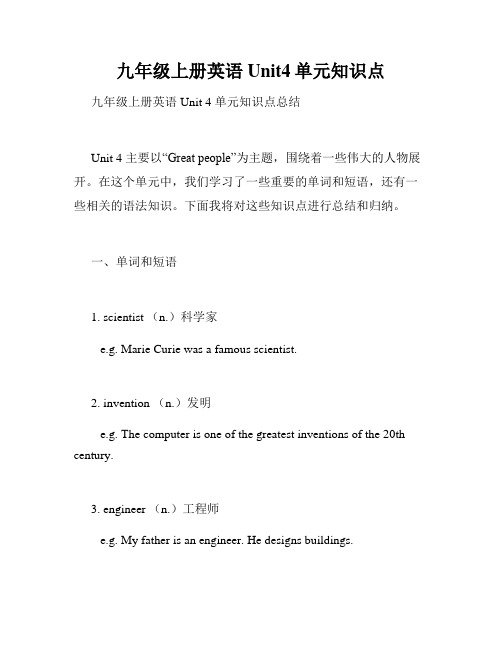
九年级上册英语Unit4单元知识点九年级上册英语Unit 4 单元知识点总结Unit 4 主要以“Great people”为主题,围绕着一些伟大的人物展开。
在这个单元中,我们学习了一些重要的单词和短语,还有一些相关的语法知识。
下面我将对这些知识点进行总结和归纳。
一、单词和短语1. scientist (n.)科学家e.g. Marie Curie was a famous scientist.2. invention (n.)发明e.g. The computer is one of the greatest inventions of the 20th century.3. engineer (n.)工程师e.g. My father is an engineer. He designs buildings.4. reflect (v.)反射;反映e.g. The mirror reflects light.5. electricity (n.)电力e.g. We use electricity to power our homes.6. successful (adj.)成功的e.g. Bill Gates is a successful businessman.7. revolution (n.)革命e.g. The Industrial Revolution had a great impact on society.8. achieve (v.)实现;取得e.g. If you work hard, you can achieve your goals.9. feature (n.)特征;特点e.g. This new smartphone has many great features.10. create (v.)创造e.g. Beethoven created many beautiful symphonies.二、语法知识1. 形容词的比较级和最高级a. 基本形式:原级b. 比较级:原级+erc. 最高级:原级+este.g. brave(勇敢的)→braver(更勇敢的)→bravest(最勇敢的)2. 物主代词a. 形容词性物主代词:my, your, his, her, its, our, theirb. 名词性物主代词:mine, yours, his, hers, (ones) ours, theirs3. 定义性从句定义性从句用来对前面所提的名词或代词给出进一步的解释或说明。
人教版九年级英语Unit4重点知识归纳

Unit4 I used to be afraid of the dark重点知识归纳一、词汇应用1.be silent in class在课堂上保持沉默2.be interested in ... 对……感兴趣3.on a basketball team 在篮球队4.from time to time 时常;有时5.turn red 变红6.get good scores on the exams 在考试中取得好成绩7.wear glasses 戴眼镜8.take up singing 开始唱歌9.deal with her shyness 克服她的羞怯10.not ... anymore 不再……11.in front of crowds 在众人面前12.all the time 频繁;反复13.get tons of attention 被众人所关注;吸引无数目光14.worry about ... / be worried about ... 担心……;担忧……15.be careful about ... 对……小心16.give up your normal life 放弃你正常的生活17.the road to success 成功之路18.fight on 奋力坚持下去;继续战斗19.require a lot of talent and hard work 需要很大的天赋和勤奋20.make it to the top 成功21.give a speech 发表演讲22.in public 公开地;在别人面前23.be nervous about tests 考试紧张24.do well in school 在学校表现好25.cause problems 制造麻烦26.take care of sb. 照顾某人27.influence his schoolwork 影响他的学业28.be absent from classes 缺课;缺勤29.fail his examinations 他考试不及格30.in person 亲身;亲自31.even though 即使;虽然32.think of sb. 想起某人33.become active in many other activities在许多别的活动中变得积极34.send sb. to a boarding school 将某人送到一所寄宿学校35.dare to do sth. 敢做某事36.make the decision to do sth. 决定做某事37.advise sb. to do sth. 建议某人做某事二、重点句型1.I used to be afraid of the dark.我过去常常前害怕黑暗.2.I go to sleep with my bedroom light on.我开着卧室的灯睡觉.3.I used to spend a lot of time playing games with my friends.以前我常常花很多时间和我的朋友们玩游戏.4.I hardly ever have time for concerts.我几乎没有时间去听音乐会.5.My life has changed a lot in the last few years.我的生活在过去几年里改变了很多.6.It will make you stressed out.那会使你紧张的.7.It seems that Yu Mei has changed a lot.玉梅似乎变化很大.三、词汇讲解1. silentsilent是形容词,意为“沉默的;无言的”,其名词形式为silence。
人教版英语九年级Unit4单元知识点归纳
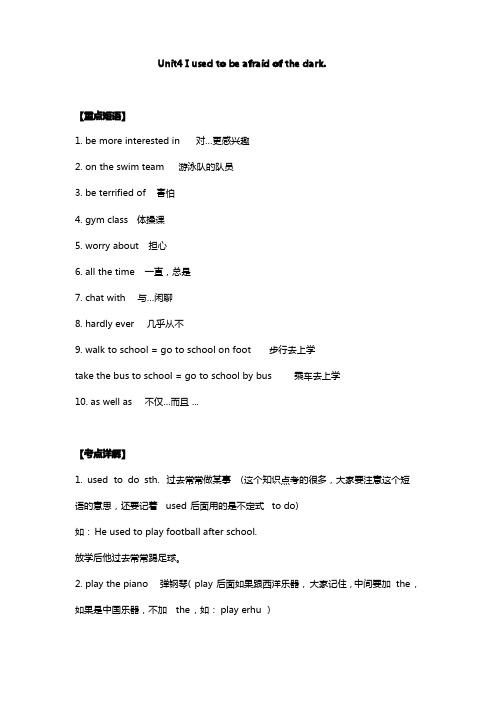
Unit4 I used to be afraid of the dark.【重点短语】1. be more interested in对…更感兴趣2. on the swim team游泳队的队员3. be terrified of害怕4. gym class体操课5. worry about担心6. all the time一直,总是7. chat with与…闲聊8. hardly ever几乎从不9. walk to school = go to school on foot步行去上学take the bus to school = go to school by bus乘车去上学10. as well as不仅…而且...【考点详解】ed to do sth.过去常常做某事(这个知识点考的很多,大家要注意这个短语的意思,还要记着used后面用的是不定式to do)如:He used to play football after school.放学后他过去常常踢足球。
2. play the piano弹钢琴(play后面如果跟西洋乐器,大家记住,中间要加the,如果是中国乐器,不加the,如:play erhu)3.①be interested in sth.对…感兴趣②be interested in doing sth.对做…感兴趣(对于这两个用法大家一定要掌握,切记切记)如:He is interested in math, but he isn't interested in speaking English.他对数学感兴趣,但是他对说英语不感兴趣。
4. interested adj.感兴趣的,指人对某事物感兴趣,往往主语是人interesting adj.有趣的,指某事物/某人具有趣味,主语往往是物(对于interested 和interesting要区分清楚,一个主语往往是人,一个主语往往是物)5. be terrified of sth.害怕……如:I am terrified of the dog.be terrified of doing sth.害怕做……如:I am terrified of speaking.6. spend动词,表示“花费金钱、时间”(spend和pay for它们的主语都是人,这一点大家要清楚)①spend…on sth.在某事上花费(金钱、时间)(重要考点)②spend…(in)doing sth.花费(金钱、时间)去做某事(重要考点,尤其要注意动名词,也就是动词的ing形式)如:He spends too much time on clothes.他花费太多的时间在衣着上。
九年级初三英语上册unit 4基础知识默写(背诵版)

although/though
23
强迫
v.
force
被迫去做
beforced to do
24
逗留;保持不变
v.
remain
永葆青春察觉到(3种)
take notice of
notice
pay attention to
26
成就
n.
achievement
27
要紧,有重大影响
v.
matter
健康对我们重要。
Health matters to us.
Health is important to us.
28
对抗;与…相反;违反;靠
prep.
against
29
爆发
break out
30
记录
n.
record
31
胜利
n.
victory
32
精神;幽灵;灵魂
n.
spirit
33
躲藏起来(过去式-过去分词)
50
scholarship
n.
奖学金
51
graduate
v.
毕业
52
league
n.
联盟,社团
53
prove
v.
证明
54
career
n.
生涯,职业
55
symbol
n.
象征
56
Jew
n.
犹太人
57
Nazi
n.
纳粹的
58
survive
v.
幸存,生存
59
admire
v.
钦佩,羡慕
人教英语九年级Unit 4 知识点归纳
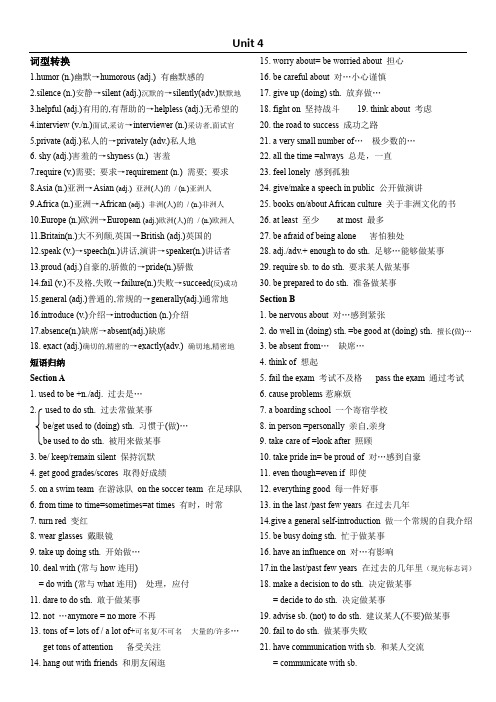
词型转换1.humor (n.)幽默→humorous (adj.) 有幽默感的2.silence (n.)安静→silent (adj.)沉默的→silently(adv.)默默地3.helpful (adj.)有用的,有帮助的→helpless (adj.)无希望的4.interview (v./n.)面试,采访→interviewer (n.)采访者,面试官5.private (adj.)私人的→privately (adv.)私人地6. shy (adj.)害羞的→shyness (n.) 害羞7.require (v.)需要; 要求→requirement (n.) 需要; 要求 (n.)亚洲→Asian (adj.) 亚洲(人)的/ (n.)亚洲人9.Africa (n.)亚洲→African (adj.) 非洲(人)的/ (n.)非洲人10.Europe (n.)欧洲→European (adj.)欧洲(人)的/ (n.)欧洲人11.Britain(n.)大不列颠,英国→British (adj.)英国的12.speak (v.)→speech(n.)讲话,演讲→speaker(n.)讲话者13.proud (adj.)自豪的,骄傲的→pride(n.)骄傲14.fail (v.)不及格,失败→failure(n.)失败→succeed(反)成功15.general (adj.)普通的,常规的→generally(adj.)通常地16.introduce (v.)介绍→introduction (n.)介绍17.absence(n.)缺席→absent(adj.)缺席18. exact (adj.)确切的,精密的→exactly(adv.) 确切地,精密地短语归纳Section A1. used to be +n./adj. 过去是…2. used to do sth. 过去常做某事be/get used to (doing) sth. 习惯于(做)…be used to do sth. 被用来做某事3. be/ keep/remain silent 保持沉默4. get good grades/scores 取得好成绩5. on a swim team 在游泳队on the soccer team 在足球队6. from time to time=sometimes=at times 有时,时常7. turn red 变红8. wear glasses 戴眼镜9. take up doing sth. 开始做…10. deal with (常与how连用)= do with (常与what连用) 处理,应付11. dare to do sth. 敢于做某事12. not …anymore = no more不再13. tons of = lots of / a lot of+可名复/不可名大量的/许多…get tons of attention 备受关注14. hang out with friends 和朋友闲逛15. worry about= be worried about 担心16. be careful about 对…小心谨慎17. give up (doing) sth. 放弃做…18. fight on 坚持战斗19. think about 考虑20. the road to success 成功之路21. a very small number of…极少数的…22. all the time =always 总是,一直23. feel lonely 感到孤独24. give/make a speech in public 公开做演讲25. books on/about African culture 关于非洲文化的书26. at least 至少at most 最多27. be afraid of being alone 害怕独处28. adj./adv.+ enough to do sth. 足够…能够做某事29. require sb. to do sth. 要求某人做某事30. be prepared to do sth. 准备做某事Section B1. be nervous about 对…感到紧张2. do well in (doing) sth. =be good at (doing) sth. 擅长(做)…3. be absent from…缺席…4. think of 想起5. fail the exam 考试不及格pass the exam 通过考试6. cause problems惹麻烦7. a boarding school 一个寄宿学校8. in person =personally 亲自,亲身9. take care of =look after 照顾10. take pride in= be proud of 对…感到自豪11. even though=even if 即使12. everything good 每一件好事13. in the last /past few years 在过去几年14.give a general self-introduction 做一个常规的自我介绍15. be busy doing sth. 忙于做某事16. have an influence on 对…有影响17.in the last/past few years 在过去的几年里(现完标志词)18. make a decision to do sth. 决定做某事= decide to do sth. 决定做某事19. advise sb. (not) to do sth. 建议某人(不要)做某事20. fail to do sth. 做某事失败21. have communication with sb. 和某人交流= communicate with sb.知识点总结1. sb. used to do sth. 某人过去常做…(现在不做了)sb. used to be a/an … 某人过去是一名… sb. used to be+adj.… 某人过去…There used to be … (某时/某地)过去有… 肯定句: They used to play together. 否定句:①They didn ’t use to play together. ②They usedn’t to play together. 一般疑问句:①Did they use to play together ? ②Used they to play together? 反义疑问句:①They used to play together, did n ’t they? ②They used to play together, used n ’t they? 【辨析】 used to do sth. 过去常常做某事 use …to do sth. 用…做… be used to do sth. 被用来做…get/be used to (doing) sth. 习惯于(做)某事 2. What’s sb. like? (问外貌+性格) What does sb. look like? (只问外貌) 3. such + 名词短语 如此…的… so + 形/副 这(那)么地…【注意】①such +a / an+形容词+可单= so+形容词+a / an +可单 ②当名词前有many, much, few 或little 等修饰时,用so 而不用such 4. dare to do sth. 敢于做某事(常用在肯定句里)实义动词 dare do sth. (常用在否定句或条件状语从句)情态动词 5. It ’s (It has) been+时间段+ since 从句 (从句用一般过去时) 自从…以来有多长时间了 6. take up (doing) sth. 开始(做)… (某种爱好)take up sth. 占据(时间/空间) 【拓展】take 词组take off 起飞;脱下;动身 take down 记下;取下 take place 发生;举行 take a look 看一下 take a walk 散步 take away 带走,拿走,取走 take care of 照顾;照料 take charge 掌管,负责 7. have difficulties (in) doing sth. 在做某事方面有困难 (difficulties 可用difficulty / trouble / problems 替换) 8. require sth. 需要,依靠…require sb. to do sth. 要求某人做某事 require doing sth. 需要被… (主动表被动)require that 从句 (从句谓语动:should +动原,should 可省)e.g. My bike requires repairing.9. seldom 不常;很少 (频度副词) (否定词, 位于实前be 后) 常见的否定词还有 hardly (ever), never, few, little 等 e.g. She sel dom goes out after ten o’clock , does he ? 10. fail the exam = fail in the exam 考试不及格 fail in (doing) sth. 在某一方面失败/做某事失败 fail to do sth. 未能做某事 11. be proud of +名/代/Ving= take pride in +名/代/Ving 为…骄傲/自豪 the pride of … …的骄傲e.g. We are proud of Lucy. = We take pride in Lucy. Lucy is the pride of us. 露西是我们的骄傲。
- 1、下载文档前请自行甄别文档内容的完整性,平台不提供额外的编辑、内容补充、找答案等附加服务。
- 2、"仅部分预览"的文档,不可在线预览部分如存在完整性等问题,可反馈申请退款(可完整预览的文档不适用该条件!)。
- 3、如文档侵犯您的权益,请联系客服反馈,我们会尽快为您处理(人工客服工作时间:9:00-18:30)。
九年级英语Unit41. if 引导的非真实性条件状语从句即虚拟语气通过动词形式的变化来表示说话人对发生的动作或存在的状态,所持的态度或看法的动词形式称为语气,虚拟语气表示说话人所说的话不是事实,而是一种祝愿,建议或是与事实相反的假设等。
If 引导的条件状语从句分为真实和非真实条件句,非真实条件句应用虚拟语气。
如果要表示与现在或将来事实相反时,其虚拟语气结构为:即(从句)if +主语+动词过去式(be 动词用were), 一般过去时(主句) 主语+would+动词原形过去将来时如:If I had time, I would go for a walk.如果我有时间,我就会去散步。
(事实上我现在没有时间) If I were you, I would take an umbrella.假如我是你的话,我会带上雨伞。
(事实上我不是你)I would say no if someone asked me to be in a movie. 假如有人请我当电影演员,我会表示拒绝。
(事实上瑞没有人请我当电影演员)5. be late for 迟到如:I am late for work/ school/ class/ party.2. pretend to do sth.假装做某事I pretended to sleep just now.pretend +从句假装…I pretended that I fell asleep.6. a few 与a little 的区别,few 与little 的区别⑴a few 一些修饰可数名词a little 一些修饰不可数名词/形容词/形容词比较级两者表肯定意义如:He has a few friends. 他有一些朋友。
There is a little sugar in the bottle. 在瓶子里有一些糖。
⑵few 少数的修饰可数名词little 少数的修饰不可数名词但两者表否定意义如:He has few friends. 他没有几个朋友。
There is little sugar in the bottle.在瓶子里没有多少糖。
7. hundred, thousand , million, billion (十亿)词前面有数词或several一词时要不能加s ,反之,则要加s 并与of 连用,表示数量很多如:several hundred/ thousand/ million/ billion people几百/千/百万/十亿人hundreds of trees 上百棵树8. what if + 从句如果…怎么办,要是…又怎么样如:What if she doesn’t come? 要是她不来怎么办?What if LiLei knows? 如果李雷知道了怎么办?8. add sth. to sth. 添加…到…如:I added some sugar to water. 我把糖添加到水里。
9. 系动词与形容词连用get nervous 变得紧张feel shy 觉得害羞look friendly 看起来友好10. too +形/副+to do sth. 太…而不能如:I’m too tired to stand. 我太累了而不能站。
11. help with sth.如:They help with this problem.help sb. do.如:They help you relax. 他们帮助你放松12. in public 在公共场所如:Don’t smoke in public. 请不要在公共场所吸烟。
13. energetic adj. 活力的如:She is an energetic girl. 她是一个活力的女孩。
energy n. 活力如:She has lots of energies. 她有活力。
14. ask sb. to do 叫…做某事ask sb. not to do sth.叫…不要做某事tell sb. to do 告诉…做某事tell sb. not to do sth. 告诉…不要做某事如:Teacher asked me to clean the classroom.Teacher asked me not to clean the classroom.15. start doing == start to do. 开始做某事如:He started speaking/ to speak. 他开始说话。
What’s ×× like? 问“品质性格”。
17.wait for sb.等某人如:I am wait for him. 我正在等他。
18. introduce sb. to sb. 把某人介绍给某人如:I introduced Lily to Anna. 我把莉莉介绍给安娜。
19. invite sb. to do 邀请某人做某事如:Lily invited me to go to her home for supper. 莉莉邀请我去她家吃晚饭。
21permission (n.) 允许,许可 permit (v.) 允许without permission 未经许可22. have dinner/ supper 吃晚饭have lunch/ breakfast 吃午餐、吃早餐23 not… in the slightest 根本不24.plenty of 修饰不可数名词,也可以修饰可数名词许多如:They have plenty of food/ apples. 他们有许多的食物/苹果。
25. get along/on (well) with sb. 与…相处如:Do you get along well with your friends? 你和你的朋友相处得好吗?26. would rather do sth. than do sth.表示愿做某事而不愿做某事如:I would rather walk than run.27. right away 立刻,马上28be friendly to 对…友好32. let sb. down 让某人失望如:Don’t let your mother down. 不要让你的妈妈失望。
33. come up with sth.提出想出如:He came up with a good idea. 他提出了一个好主意。
catch up with sb.追上赶上如:Lily caught up withAnna. 莉莉赶上了安娜。
34. have experience doing在做某事有经验如:I have experience teaching Chinese. 我在教英语方面有经验。
35. come out 出版,出来如:The magazine comes out once a week. 这种杂志每周出一次。
36. by accident偶然地,无意之中如:Last week I cut my finger by accident. 上个星期我不小心割到自己的手指。
37.hurry to do匆忙…I hurry to call the police.38. more than超过=over less than少于40. offer sb. sth. 给某人提供某物41 refuse to do ,拒绝做某事42 agree to do,同意做某事宾语从句宾语从句在复合句中作主句的宾语。
由连接词+ 主语+ 谓语构成常由下面的一些词引导:㈠由that 引导表示陈述意义that 可省略He says (that) he is at home. 他说他在家里。
㈡由if , whether 引导表示一般疑问意义(带有是否、已否、对否等)I don’t know if / whether Wei Hua likes fish.我不知道韦华是否喜欢鱼。
㈢由连接代词、连接副词(疑问词) 引导表示特殊疑问意义Do you know what he wants to buy? 你知道他想要买什么吗?㈣从句时态要与主句一致当主句是一般现在时,从句根据情况使用任何时态He says (that ) he is at home. 他说他在家里。
I don’t know (that) she is singing now. 我不知道她正在唱歌。
She wants to know if I have finished my homework.她想要知道我是否已经完成了我的作业。
Do you know when he will be back? 你知道他将会什么时候回来?当主句是一般过去时,从句应使用过去某时态(一般过去时,过去进行时,过去将来时,过去完成时)He said (that) he was at home. 他说他在家里。
I didn’t know that she was singing now. 我不知道她正在唱歌。
She wanted to know if I had finished m homework.她想要知道我是否已经完成了我的作业。
Did you know when he would be back? 你知道他将会什么时候回来?。
